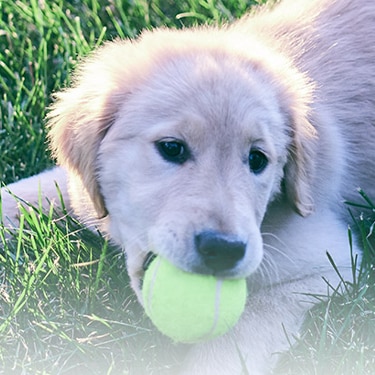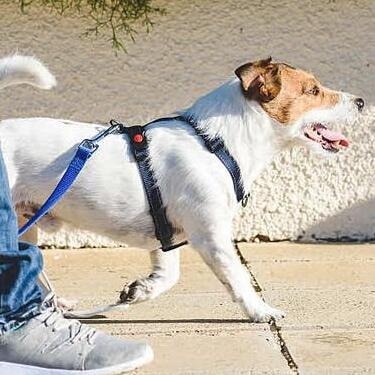Start your new friendship off on the right paw
Start your new friendship off on the right paw
First-time dog owner?
Here are some expert tips and resources that can help give you and your new best friend the smoothest transition possible
What to expect with your new dog
Adding a furry new member to your family can be exciting, but it can also be stressful if you’re not prepared. Not sure what you’ll need the first week? The first month? Choose an option below for a sense of what’s ahead.
- Puppy
- Adult Dog
- Senior (7+) Dog
Within the first week:
Puppies are bursting with energy and exploration. Prepare for some late nights, a lot of love and a few accidents on the carpet. For a little more detail, check out this puppy timeline.
Within the first month:
Your puppy’s initial excitement will subside, but they’ll still have plenty of energy to burn. Schedule some playtime each day.
Within the first six months:
Your puppy will soon be reaching adult size, but now more than ever, sticking to a healthy routine will be vital to their wellbeing.
Within the first week:
Your dog will need some time to adjust to the new surroundings and people. Be patient, as they may still be marking, hiding and exploring boundaries.
Within the first month:
As your dog continues to adjust to home life, now is a good time to start reinforcing healthy routines and behaviors for day-to-day life.
Within the first six months:
By now, your dog will likely feel like a member of the family. This new level of comfort means that you can introduce new forms of training and share exciting new experiences together.
Within the first week:
Older dogs need different care as they age. You’ll likely have less energy to deal with, but you’ll want to keep their health top of mind. Learn how to keep your senior dog feeling youthful.
Within the first month:
While you’re less likely to be chasing them around the yard, some level of activity can help keep their golden years as healthy as possible.
Within the first six months:
Dog parent FAQs
One new dog is worth a million questions, but here are some common ones you no longer have to search for:
Before your dog enters the home, you’ll want to make sure everyone you live with understands how they will welcome their new friend, as well as what their new responsibilities entail.
Remember that puppies have LOTS of energy, and may want to chew on, jump on, and “mark” different things and places around the house.
On the other end, senior dogs often have less energy compared to younger dogs, so set expectations with children and other family members so you don’t overwhelm your new friend.
Consider crate training to establish a regular bathroom routine, as well as a way to find peace of mind while you’re not home.
At a minimum, a healthy dog needs one thorough veterinary checkup a year. Dogs can hide symptoms of injuries and illnesses, so it’s up to you to establish what is “normal” behavior for your dog and keep an eye out for anything that seems unusual.
Depending on their lifestage, you will want to adjust your dog’s food accordingly.
Puppies (Under Age 1)
It's crucial to get puppies on the right puppy food to encourage proper development and growth. Make sure to speak to your veterinarian about a puppy food that provides adequate nutrients for their age based on their potential adult size.
Adult Dogs (1-7 Years)
Healthy dogs in their prime years need an adult dog food with a balance of high-quality ingredients, plus antioxidants and omega-6 fatty acids to help support their everyday needs.
Older Dogs (Age 7+)
Older dogs don’t require the same levels of protein and phosphorus, so your senior friend will likely need to support more specific needs for mobility and brain function, such as phytonutrients and L-carnitine. Look for a senior dog food that will support your older friend’s needs throughout the golden years.
Contrary to popular belief, regularly feeding your new dog human food can lead to obesity, dental issues, GI upset and finicky eating habits. It’s important to know which types of foods to avoid giving dogs to reduce any potential health risks.
Rather than feeding people food as treats, ask your veterinarian about a healthier alternative designed for dogs.
No matter what age your dog is, there is definitely a cost to giving them a happy and healthy life. The ASPCA estimates that annual dog care costs range from $420-$780, and that doesn’t include unexpected trips to the vet or moments of weakness when you see a dog toy that your furry friend just “has to have.” Make sure you’re ready to care for your dog physically, emotionally AND financially before you commit to making a forever friend.
Dogs experience their whole world through their mouths. It’s no wonder that they find chewing on different objects a way to relieve stress or show anxiety. Another possibility is that your dog is just bored! There are a number of ways to correct this behavior over time, so be patient and remember to explore all your options.
People tend to assume that a dog is being spiteful or intentional with marking, but there are less malicious reasons behind these types of behaviors. Peeing on objects around the house is often a sign of anxiety, or even a potential medical condition that is affecting your dog.
Dogs can also manifest anxiety in the form of digestive problems, so while it is easy to blame the food your feeding your dog, one of the worst things you can do to try and improve the problem is switch their food right away.
The important thing to remember is not to lose hope. As your dog starts to get more comfortable at home, and your vet has eliminated any potential health problems, you can work on reinforcing the good habit of doing their business outside with lots of praise.


Win a year’s supply of Hill’s pet food
Submit your dog or cat for a chance to be our next Pet of the Month and you could win a year’s supply of Hill’s pet food on us!

















